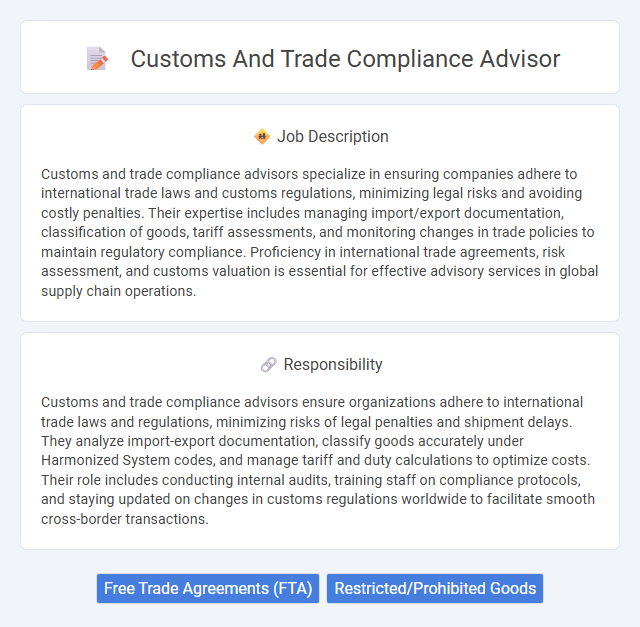
Customs and trade compliance advisors specialize in ensuring companies adhere to international trade laws and customs regulations, minimizing legal risks and avoiding costly penalties. Their expertise includes managing import/export documentation, classification of goods, tariff assessments, and monitoring changes in trade policies to maintain regulatory compliance. Proficiency in international trade agreements, risk assessment, and customs valuation is essential for effective advisory services in global supply chain operations.
Individuals with strong analytical skills, attention to detail, and a keen understanding of international trade regulations are likely to be suitable for a Customs and Trade Compliance Advisor role. Those who can navigate complex legal frameworks and adapt quickly to changes in trade policies may find this position rewarding. However, people who struggle with regulatory complexity or prefer less structured environments might face challenges in this job.
Qualification
A Customs and Trade Compliance Advisor must possess in-depth knowledge of international trade regulations, import/export laws, and tariff classification to ensure lawful and efficient cross-border transactions. Proficiency in compliance management systems, risk assessment methodologies, and strong analytical skills are essential for identifying potential regulatory issues and implementing corrective measures. Certification such as Certified Customs Specialist (CCS) or relevant experience with regulatory bodies like the World Customs Organization (WCO) enhances the advisor's capability to navigate complex trade compliance landscapes.
Responsibility
Customs and trade compliance advisors ensure organizations adhere to international trade laws and regulations, minimizing risks of legal penalties and shipment delays. They analyze import-export documentation, classify goods accurately under Harmonized System codes, and manage tariff and duty calculations to optimize costs. Their role includes conducting internal audits, training staff on compliance protocols, and staying updated on changes in customs regulations worldwide to facilitate smooth cross-border transactions.
Benefit
Customs and trade compliance advisors likely enhance a company's ability to navigate complex international regulations, reducing risks of costly fines and shipment delays. Their expertise probably streamlines import and export processes, improving operational efficiency and fostering smoother global trade relations. Companies may see increased trust from partners and regulators due to adherence to compliance standards advocated by these advisors.
Challenge
Customs and trade compliance advisors likely face the challenge of keeping up-to-date with constantly evolving regulations and international trade laws, which can vary significantly across different countries. They probably need to manage complex documentation and ensure accuracy to avoid costly penalties or shipment delays. Navigating these intricate rules while balancing operational efficiency could present ongoing difficulties in their role.
Career Advancement
A Customs and Trade Compliance Advisor plays a critical role in ensuring businesses adhere to complex international trade regulations, minimizing legal risks and optimizing supply chain efficiency. Career advancement in this field typically involves gaining expertise in global trade laws, mastering compliance software, and acquiring certifications such as CCLP (Certified Customs & Logistics Professional). Progression often leads to senior advisory roles, management positions, or specialized consultancy opportunities within multinational corporations or government agencies.
Key Terms
Free Trade Agreements (FTA)
Customs and trade compliance advisors specialize in navigating Free Trade Agreements (FTAs) to optimize tariff reductions and regulatory adherence for international transactions. Their expertise ensures accurate classification, documentation, and duty optimization aligned with FTAs such as USMCA, EU-UK Trade Agreements, and ASEAN Trade in Goods Agreement. Mastery of FTAs enables companies to maximize cost savings, minimize customs risks, and maintain seamless cross-border supply chain operations.
Restricted/Prohibited Goods
A Customs and Trade Compliance Advisor specializing in Restricted/Prohibited Goods ensures adherence to international regulations governing the import and export of sensitive items such as hazardous materials, controlled substances, and dual-use technologies. They conduct comprehensive risk assessments, maintain updated knowledge of global trade restrictions, and implement robust compliance programs to prevent legal violations and penalties. Expertise in classification, documentation, and coordination with customs authorities is essential to facilitate smooth cross-border transactions while safeguarding corporate reputation.
 kuljobs.com
kuljobs.com